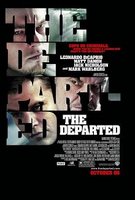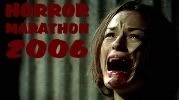The Departed (2006)
 Props to Martin Scorsese for his continued ability to reinvent himself, reinforcing the notion that the more things change, the more they stay the same. While the feel of his films has been ever shifting (throughout his entire career, but seemingly more so these past few years), his matters of interest - the criminal underworld, identity stricken characters, and the long shadow of religion - have rarely altered. While old school fans of Scorsese (for many of whom his entire catalogue consists of nothing but Taxi Driver, Raging Bull, GoodFellas, Casino and - if you're lucky - Mean Streets) have been tireless in their juvenile dissent towards his casting of Leonardo DiCaprio, they've also been blind to the fact that he's entered a new stage in his career with great vigor, while other directors would begin to show their wear and tear. Expecting his familiar 70's brutality or 90's flair, they've gone and missed his new stylistic branches: Gangs of New York was a full-bodied opera on a near biblical level, and The Aviator - while more narratively conservative - was still a near-masterful reinvention of old Hollywood convetions, and a bold character study.
Props to Martin Scorsese for his continued ability to reinvent himself, reinforcing the notion that the more things change, the more they stay the same. While the feel of his films has been ever shifting (throughout his entire career, but seemingly more so these past few years), his matters of interest - the criminal underworld, identity stricken characters, and the long shadow of religion - have rarely altered. While old school fans of Scorsese (for many of whom his entire catalogue consists of nothing but Taxi Driver, Raging Bull, GoodFellas, Casino and - if you're lucky - Mean Streets) have been tireless in their juvenile dissent towards his casting of Leonardo DiCaprio, they've also been blind to the fact that he's entered a new stage in his career with great vigor, while other directors would begin to show their wear and tear. Expecting his familiar 70's brutality or 90's flair, they've gone and missed his new stylistic branches: Gangs of New York was a full-bodied opera on a near biblical level, and The Aviator - while more narratively conservative - was still a near-masterful reinvention of old Hollywood convetions, and a bold character study. The Departed once again proves that Scorsese is, above all else, damn cool. Itself a remake of Internal Affairs - a Hong Kong feature itself greatly indebted to Scorsese - the film is like a twice-removed reinterpretation of his long-running contributions, only delivered with just as much potency as its multi-filtered influences. The story isn't as complicated as one might think at first glance, but the whole film is pitched at such a manic level that it takes a bit to soak it all up. Gangster Frank Costello (Jack Nicholson) rules the streets of Boston, where two Irish boys grow up to become members of the local police force. Colin Sullivan (Matt Damon) has an easier time, helped in no small way by his connections with Frank for the mutual benefit of cop and criminal. Billy Costigan (Leonardo DiCaprio), his image tarnished by a bad family history, is forced to take an undercover job, slowly building credibility and infiltrating Costello's inner circle.
Despite there being no shortage of ballsy kick to the entire production (the combination of sight and sound, not to mention the bitingly subversive humor, is so frantic it takes some time to properly adjust oneself to it), everything in the film is also given plenty of room to breath, with both the filmmaker and his very capable actors holding equal ground. Performances are good, from DiCaprio and Damon's inner simmering, Nicholson's gleeful gnashing and Mark Wahlberg's nothing-short-of-douchebag expletive dropping, all of which are impressionable but know when to stop lest they overtake all around them. Yet what remains notable is that, while Scorsese tends to find a deep intimacy with his subjects through his use of the medium, The Departed - perhaps by necessity - remains slightly detached, more an observer than a direct part of the action, perhaps an extension of these characters' own grappling with their identity, or lack thereof, in the world. The lying, backstabbing, vengeance and all that comes of it here is the stuff of a postmodern, Shakespearean American tragedy, and Scorsese knows how to deliver the goods.






"the stuff of a postmodern, Shakespearean American tragedy"
I think that sums up "The Departed" perfectly. Maybe it's because the movie is somewhat detached that I can't cuddle up with it the way I can the bruised emotionality of "The Black Dahlia." The witty punchlines in "The Departed" are much better than the moments of contemplation. (Along the same lines, did you really find yourself invested in any of the characters?)
Posted by Anonymous |
3:53 AM
Anonymous |
3:53 AM